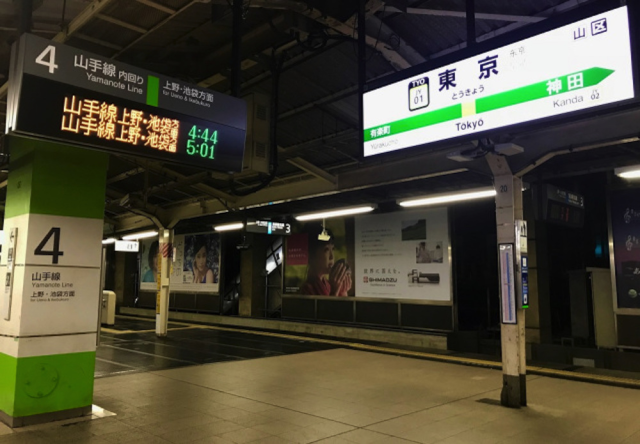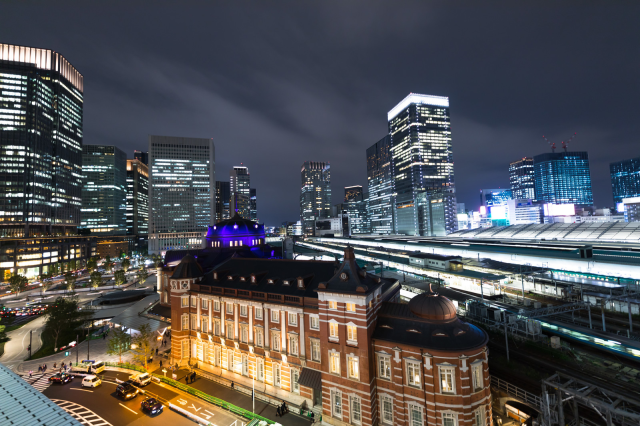
Tokyo’s last trains are too early for many travelers and partiers, but they’re a God-send for overworked office employees.
In Japan, the last train of the night is the ultimate party pooper. If you’re out enjoying the nightlife in Tokyo, the last train on any line is around 12:30 a.m., and if you need to make a transfer to get back to your hotel or apartment, you’ll probably need to shut your party down even sooner, often before the stroke of midnight.
Recently we got the additional buzzkill that the Yamanote loop, Tokyo’s most important and convenience rail line, is going to be shutting down even sooner during an extended construction period. This week, though, came some happy news on the opposite end of the spectrum, as the 2020 Tokyo Olympics Organizing Committee has announced that during the Games trains in the city are going to be running much later than usual.
The last trains for the Yamanote Line (which is operated by Japan Railway) and a number of subway lines that crisscross downtown Tokyo won’t leave until sometime after two o’clock in the morning during the games, which are scheduled to run from July 24 to August 9, 2020. A number of lines which run from downtown Tokyo out into the suburbs, including ones run by rail operators Tokyo, Seibu, Odakyu, Keiei, and Keikyu, are also looking into extending their last trains by 30 to 90 minutes during the period.
▼ Tokyo Station
The intended purpose of the revised schedules is to give spectators extra time to make their way home from competition venues, but it should also be a boon to travelers and locals who want to keep drinking, dancing, or otherwise carousing a little longer without having to stay out all night or shell out for an expensive taxi ride.
But while that makes it sound like a win-win situation, there’s a chance that a later last train could actually be a win-win-lose scenario. So what’s that potential third, losing demographic? Overworked office employees.
Overtime in Japan is no joke. In many companies it’s not a question of if employees will have to put in overtime, but how much. For the staff of the busiest offices, the last train is actually their savior, since “I have to stop working now, because the last train I can take to go home is leaving” is one of the few reasons that’s virtually always accepted for capping a day’s overtime in Japan.
So while sports fans and party people will be happy to have an extra hour or two of fun, for salarymen and businesswomen the new schedule might just end up extending their already hellishly long work days. Hopefully their bosses recognize the later last trains as what they’re supposed to be, though: a way to promote Olympic spirit, not pad companies’ bottom lines.
Sources: Tokyo Olympics Organizing Committee, Tokyo Metropolitan Government
Top image ©SoraNews24
Insert images: Pakutaso (1, 2)
● Want to hear about SoraNews24’s latest articles as soon as they’re published? Follow us on Facebook and Twitter!
[ Read in Japanese ]



 What’s the best part of Tokyo to live in, and why? Survey gives the top six picks
What’s the best part of Tokyo to live in, and why? Survey gives the top six picks Tokyo partially shut down busiest train line, 3,200 workers fought clock on platform project【Vid】
Tokyo partially shut down busiest train line, 3,200 workers fought clock on platform project【Vid】 Tokyo’s busiest train line to be partially shut down this weekend as part of Shibuya renovations
Tokyo’s busiest train line to be partially shut down this weekend as part of Shibuya renovations Crazy comparison shows why Tokyo’s massive train network even freaks out some Japanese people
Crazy comparison shows why Tokyo’s massive train network even freaks out some Japanese people Tokyo travel alert: City’s most important train line shutting down for construction this weekend
Tokyo travel alert: City’s most important train line shutting down for construction this weekend Foreigner’s request for help in Tokyo makes us sad for the state of society
Foreigner’s request for help in Tokyo makes us sad for the state of society Japanese-style accommodation at the new Premium Dormy Inn hotel in Asakusa will blow your mind
Japanese-style accommodation at the new Premium Dormy Inn hotel in Asakusa will blow your mind Seaside scenery, history, and so many desserts on Yokohama’s Akai Kutsu【Japan Loop Buses】
Seaside scenery, history, and so many desserts on Yokohama’s Akai Kutsu【Japan Loop Buses】 Should you add tartar sauce to Japanese curry rice? CoCo Ichi makes diners an unusual offer
Should you add tartar sauce to Japanese curry rice? CoCo Ichi makes diners an unusual offer Mikado Coffee is a 76-year-old coffee chain with a major celebrity connection
Mikado Coffee is a 76-year-old coffee chain with a major celebrity connection 11 different ways to say “father” in Japanese
11 different ways to say “father” in Japanese Katsudon vs. tonkatsu vs. katsu sandwich – What’s the best way to eat pork cutlet in Japan?
Katsudon vs. tonkatsu vs. katsu sandwich – What’s the best way to eat pork cutlet in Japan? Japanese teacher shares surprising reason why the kanji for crow has one less line than bird
Japanese teacher shares surprising reason why the kanji for crow has one less line than bird “Deflowering” services for virgin women are now a thing in Japan, apparently
“Deflowering” services for virgin women are now a thing in Japan, apparently Cappuccino Ramen becomes super popular in Japan, but is it worth the hype?
Cappuccino Ramen becomes super popular in Japan, but is it worth the hype? McDonald’s new Happy Meals offer up cute and practical Sanrio lifestyle goods
McDonald’s new Happy Meals offer up cute and practical Sanrio lifestyle goods Japanese ramen restaurants under pressure from new yen banknotes
Japanese ramen restaurants under pressure from new yen banknotes French Fries Bread in Tokyo’s Shibuya becomes a hit on social media
French Fries Bread in Tokyo’s Shibuya becomes a hit on social media Red light district sushi restaurant in Tokyo shows us just how wrong we were about it
Red light district sushi restaurant in Tokyo shows us just how wrong we were about it New private rooms on Tokaido Shinkansen change the way we travel from Tokyo to Kyoto
New private rooms on Tokaido Shinkansen change the way we travel from Tokyo to Kyoto Tokyo Tsukiji fish market site to be redeveloped with 50,000-seat stadium, hotel, shopping center
Tokyo Tsukiji fish market site to be redeveloped with 50,000-seat stadium, hotel, shopping center Japanese city loses residents’ personal data, which was on paper being transported on a windy day
Japanese city loses residents’ personal data, which was on paper being transported on a windy day Beautiful Ghibli sealing wax kits let you create accessories and elegant letter decorations【Pics】
Beautiful Ghibli sealing wax kits let you create accessories and elegant letter decorations【Pics】 Secret Kitchen bento serves Japanese flowers, birds, wind and moon in a box, but is it worth it?
Secret Kitchen bento serves Japanese flowers, birds, wind and moon in a box, but is it worth it? New definition of “Japanese whiskey” goes into effect to prevent fakes from fooling overseas buyers
New definition of “Japanese whiskey” goes into effect to prevent fakes from fooling overseas buyers Our Japanese reporter visits Costco in the U.S., finds super American and very Japanese things
Our Japanese reporter visits Costco in the U.S., finds super American and very Japanese things Studio Ghibli releases Kiki’s Delivery Service chocolate cake pouches in Japan
Studio Ghibli releases Kiki’s Delivery Service chocolate cake pouches in Japan All-you-can-drink Starbucks and amazing views part of Tokyo’s new 170 meter-high sky lounge
All-you-can-drink Starbucks and amazing views part of Tokyo’s new 170 meter-high sky lounge More foreign tourists than ever before in history visited Japan last month
More foreign tourists than ever before in history visited Japan last month New Pokémon cakes let you eat your way through Pikachu and all the Eevee evolutions
New Pokémon cakes let you eat your way through Pikachu and all the Eevee evolutions Disney princesses get official manga makeovers for Manga Princess Cafe opening in Tokyo
Disney princesses get official manga makeovers for Manga Princess Cafe opening in Tokyo Sales of Japan’s most convenient train ticket/shopping payment cards suspended indefinitely
Sales of Japan’s most convenient train ticket/shopping payment cards suspended indefinitely Sold-out Studio Ghibli desktop humidifiers are back so Totoro can help you through the dry season
Sold-out Studio Ghibli desktop humidifiers are back so Totoro can help you through the dry season Japanese government to make first change to romanization spelling rules since the 1950s
Japanese government to make first change to romanization spelling rules since the 1950s Ghibli founders Toshio Suzuki and Hayao Miyazaki contribute to Japanese whisky Totoro label design
Ghibli founders Toshio Suzuki and Hayao Miyazaki contribute to Japanese whisky Totoro label design Doraemon found buried at sea as scene from 1993 anime becomes real life【Photos】
Doraemon found buried at sea as scene from 1993 anime becomes real life【Photos】 Tokyo’s most famous Starbucks is closed
Tokyo’s most famous Starbucks is closed One Piece characters’ nationalities revealed, but fans have mixed opinions
One Piece characters’ nationalities revealed, but fans have mixed opinions We asked a Uniqlo employee what four things we should buy and their suggestions didn’t disappoint
We asked a Uniqlo employee what four things we should buy and their suggestions didn’t disappoint River of salarymen appears on totally normal, completely crazy day in Tokyo station【Video】
River of salarymen appears on totally normal, completely crazy day in Tokyo station【Video】 Tokyo trains set to become less convenient with new last train schedule
Tokyo trains set to become less convenient with new last train schedule Downtown Tokyo set to open its most important train station in 50 years, and now it has a name
Downtown Tokyo set to open its most important train station in 50 years, and now it has a name How much money do you need for a studio apartment in downtown Tokyo?
How much money do you need for a studio apartment in downtown Tokyo? These are the 11 most crowded trains in Japan…and surprise! They’re all in the Tokyo area
These are the 11 most crowded trains in Japan…and surprise! They’re all in the Tokyo area Tokyo subway bribes people with free noodles to get them to take earlier, non-rush hour trains
Tokyo subway bribes people with free noodles to get them to take earlier, non-rush hour trains Woman decides to go for a walk on the busiest train tracks at Shibuya Station【Video】
Woman decides to go for a walk on the busiest train tracks at Shibuya Station【Video】 “Men-only train car” to run in Tokyo as part of “Weak Men’s” association awareness campaign
“Men-only train car” to run in Tokyo as part of “Weak Men’s” association awareness campaign JR East to introduce numbering system at all stations in Tokyo
JR East to introduce numbering system at all stations in Tokyo Instant karma? Accused voyeur falls off bridge at Shibuya Staion, breaks several bones【Video】
Instant karma? Accused voyeur falls off bridge at Shibuya Staion, breaks several bones【Video】 Awesomely adorable Pokémon subway trains start service in downtown Tokyo【Photos】
Awesomely adorable Pokémon subway trains start service in downtown Tokyo【Photos】 Man hangs himself outside of Japan’s busiest train station
Man hangs himself outside of Japan’s busiest train station Amazing time-lapse-style video shows 150-year history of the growth of train stations in Japan
Amazing time-lapse-style video shows 150-year history of the growth of train stations in Japan Japanese train company issues official apology for “inexcusable” 25-second early departure
Japanese train company issues official apology for “inexcusable” 25-second early departure
Leave a Reply